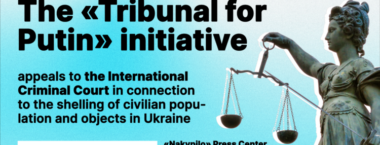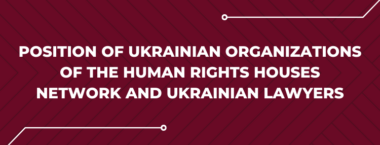Human rights defenders regard deportation as a proper name for the ban from entry Crimea, imposed by Russian authorities on Ukrainian citizens – Crimean residents. Ismet Yuksel and Refat Chubarov have experienced the impossibility to return to their homes and relatives, having been provided with no legal grounds. And these are not singular cases of the unlawful Russia’s prohibition to enter Crimea, imposed on Crimean Tatars. The aggrieved persons have nothing to do, but to sue the RF, and to endeavour to draw global community’s attention to this problem.
Refat Chubarov, the President of the Worldwide Congress of Crimean Tatars appeals to global leaders not to be late, for the 1944 tragedy is repeating in their face: “After 70 years, the devilish wheel of Moscow terror that pulled Crimean people out of Crimea and mutilated the life of several generations of Crimean Tatars in expatriation, has burst into the Crimean land again, having brought new deaths, abasements and violence. However, it is not late to change the situation yet”.
Human rights defenders are confident that Refat Chubarov and Ismet Yuksel deportation from Crimea is a doubtless sanction for their public civil position of rejection of Crimea accession to Russia. The consequences of such actions include serious violations of private and family life rights.
Ismet Yuksel, General Coordinator of Crimean News Agency believes that the reason of the ban for him to enter Crimea is his close relations with the leader of Crimean Tatars Mustafa Dzhemilev and President of the Worldwide Congress of Crimean Tatars Refat Chubarov. “An important role has also been played by my openly manifested personal public and political position based on respect for the sovereignty of any country and rejection of any interference in its internal affairs; and, surely, my professional activities connected with reporting events in Crimea in various mass media”, Mister Yuksel mentions.
Ukrainian Helsinki Human Rights Union is currently supporting two strategic cases on the ban to enter occupied Crimea, imposed on Ismet Yuksel and Refat Chubarov as representatives of the Worldwide Congress of Crimean Tatars. As for Refat Chubarov, a claim has been prepared and filed with the European Court. Ismet Yuksel’s case is currently considered by a Russian court, where the case defendant is the FSB as the authority that has prohibited the entry.
Arkady Bushchenko, the Executive Director of Ukrainian Helsinki Human Rights Union notes that RF authorities have provided no grounded evidence that the aforesaid persons, say, threaten security, public order or population’s health. Furthermore, the victims of deportation from Crimea have obtained no written grounded decision containing reasons of the entry ban. All legal claims as to receipt of such decision are still ignored by Russia.
Valeriya Lutkovska, the Commissioner of the Verkhovna Rada of Ukraine on Human Rights has mentioned that the occupation authorities’ actions towards the representatives of Crimean Tatars indicate purposeful, systemic and consistent ethnic discrimination. In particular, this is proved by cases of kidnapping and murders of Crimean Tatars, which cases are not properly investigated by Russian law-enforcement authorities; imposition of bans on peaceful gatherings and meetings arrangement by Crimean Tatars; prohibition of entry to the AR Crimea, imposed on the leaders of Crimean Tatars. “I have repeatedly addressed influential international organizations with a proposal to establish a special international mission for permanent monitoring of human rights and liberties compliance in the AR Crimea, first and foremost, rights and liberties of national minorities”, the Ukrainian Ombudsman has communicated.
Valeriya Lutkovska has also drawn attention to the fact that the Convention on the Elimination of All Forms of Racial Discrimination, the Convention for the Protection of Human Rights and Fundamental Freedoms, as well as other acts of the international law which the Russian Federation is a party to, clearly and unambiguously censure and prohibit any discrimination by nationality, and entrust the state with positive duties on elimination thereof and efficient struggle against that.



